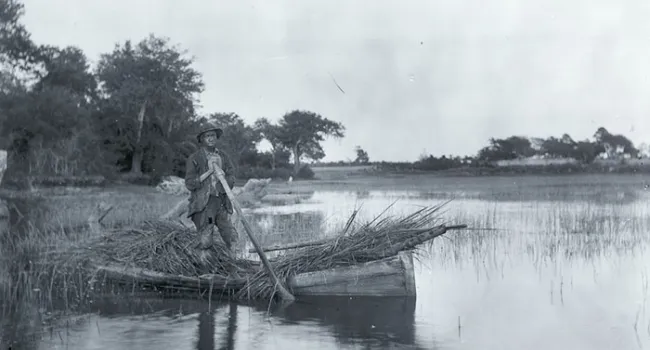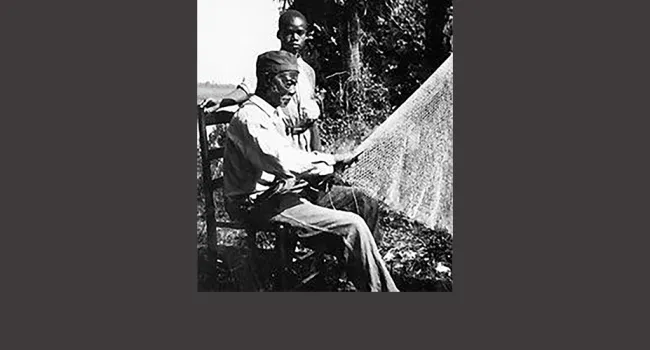From West Africa
During the late 1600s, English settlers in the new colonies needed more workers to farm thousands of acres of land on Sea Island plantations. Although some of the workers were Native Americans, most were Africans brought to the American colonies as enslaved Africans. South Carolina provided some of the main ports for the European ships that carried people from West Africa and the West Indies.
Many West Africans were skilled farmers and builders. Plantation owners wanted people from this region to farm indigo, rice and cotton. Rice, a crop that the Africans had cultivated for centuries, was highly desired throughout the world. By 1700, "Carolina Golden Rice," as it was called, became a major export from the Sea Islands. Almost as profitable as gold, it brought great wealth to the families who owned the plantations. Although the slaves provided much-needed labor, they were not paid for their work. However, Africans were rich in something that money could not buy - the cultural heritage they brought with them from their homeland.
Word Bank
Sea Islands (sea is.lands) - a group of islands off the coasts of South Carolina, Georgia and North Florida.
Native American (na.tive a.mer.i.can) n. - a descendant of any of the peoples who lived in North, Central or South America before European explorers and colonists arrived.
slave (slave) n. - a person who is owned by someone else and works without pay.
port (port) n. - a town or city with deep water where ships can dock and load or unload cargo.
West Africa (west af.ri.ca) - the region of western Africa between the Sahara Desert and the Gulf of Guinea.
West Indies (west in.dies) - a group of islands between North and South America that includes the Bahamas, the Lesser Antilles and the Greater Antilles.
indigo (in.di.go) n. - a plant used to make blue dye; historically grown on plantations.
cultivate (cul.ti.vate) v. - to grow a crop.
export (ex.port) n. - something that is sent to another country for trade or sale.
cultural heritage (her.i.tage) n. - things handed down from generation to generation, such as traditions and languages that have cultural importance.
Standards
- K.2 Utilize the college and career skills of a geographer to apply map skills and draw conclusions about place in one’s personal community.
- 1.H.3 Evaluate different sources of evidence used in historical inquiry, such as art, artifacts, digital sources, graphs, maps, oral histories, photographs/images, and texts.
- 2.CG.1 Identify cultural and ethnic groups in the U. S., explore their characteristics, and communicate how civic dispositions build relationships between groups in a diverse society.
- 3.4.1.PR Investigate the cultural characteristics of places and regions around the world.
- 4.1.CE Identify the effects of changing economic systems on the diverse populations in British North America.
Resources
You need to be logged in to listen to view this content. Create an account now; it's quick, easy, and free!
Log In to ViewDesde África Occidental
A finales del siglo XVI, los colonos ingleses en las nuevas colonias necesitaban más trabajadores para cultivar miles de acres de tierra en Las Plantaciones de Isla del Mar. Aunque algunos de los trabajadores eran Nativos Americanos, la mayoría eran Africanos traídos a las colonias Americanas como Africanos esclavizados. Carolina del Sur proporcionó algunos de los principales puertos para los barcos Europeos que transportaban a personas de África Occidental y Las Indias Occidentales.
Muchos Africanos Occidentales eran agricultores y constructores calificados. Los propietarios de plantaciones querían que personas de esta región cultivaran el índigo, el arroz y el algodón. El arroz, un cultivo que los africanos habían cultivado durante siglos, era muy deseado en todo el mundo. En 1700, "El Arroz Dorado de Carolina", como se llamaba, se convirtió en una importante exportación de las Islas del Mar. Casi tan rentable como el oro, trajo gran riqueza a las familias que eran propietarias de las plantaciones. Aunque los esclavos proporcionaban mano de obra muy necesaria, no se les pagaba por su trabajo. Sin embargo, los Africanos eran ricos en algo que el dinero no podía comprar, el patrimonio cultural que trajeron de su patria









